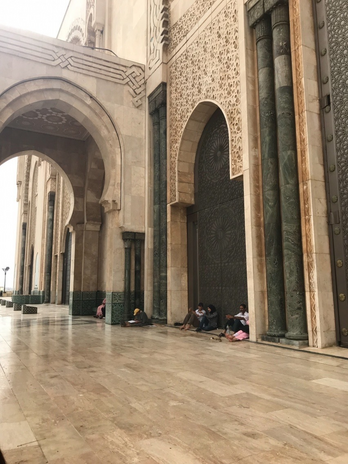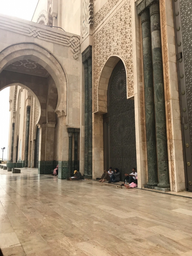Being Moroccan-American is one of the prominent facets of my identity. Some of my best memories lay on those crumbly Casablanca roads: sitting on the curb, catching my breath after endless hours of playing cache-cache with all of the kids in the neighborhood, arriving from the airport to hug my grandma as I grew taller and she grew shorter, and dipping m’semen into the sauce of the chicken tagine while dodging those pungent olives.
Growing up in post-9/11 America as an Arab Muslim was an experience, to say the least. I unassumingly overheard CNN every night as the so-called War on Terror was endlessly covered and politicians held press conferences discussing the matter. Arab nations were consistently vilified and scrutinized. It made me ashamed of my country. My country where I was always welcomed by palm trees as the plane touched as if I was a star strolling down Hollywood Boulevard with camera lights flashing in my face, where I would boastfully banter and bargain with prickly pear fruit vendors at the souk, where my grandma would feed the stray cats milk every night.
I became ashamed of my culture—the identity that set me apart from the rest as I tightly grasped tightly onto it out of fear of losing it in the fog of mundane suburbia. But I can never truly rid myself of it. I have always considered Morocco to be my happy place, not the money-grubbing, terrorist hotspot one would assume it to be upon watching twenty minutes of Fox News. It slowly occurred to me the news was brimming with inaccuracies and biases. This is also what influenced me to study journalism: to help bring an end to false narratives, like so, and to be an encompassing voice for the unheard.
But it’s more than that. Having a concurrent understanding of such drastically opposing cultures formed my personality, relationships, and values. Growing up in the United States while maintaining a pronounced exposure to my Moroccan heritage inflicted various internal conflicts concerning my place in life. My whole life felt like a conundrum, and if I am being honest, it still does. I was one of few non-white students in my elementary-middle school. When a teacher was absent and the substitute took attendance, the moment I heard the stutter or the deafening silence of that pause followed by a furrowed brow, I called out “here”. Whenever I fill out forms and am asked of my race—a pretty self-explanatory question—I can’t help but hesitate. Am I white? But Morocco is located in Africa. Does that mean I’m African-American? Should I just put “other”. But how can you categorize someone as “other”?
As I got older, I realized that I like not having a pre-made label. I am not a piece of fruit at a supermarket. I am not a shirt on a clearance rack. I am not a folder in a filing cabinet. I am truly fortunate to have emerged myself and grown up with two cultures. It makes it difficult for people to make assumptions about me because they simply do not know what to expect from me. It is a great conversation starter. It enables me to have an inclusive outlook and broad perspective on various subject and issues. And if that makes me an “other”, then so be it.


